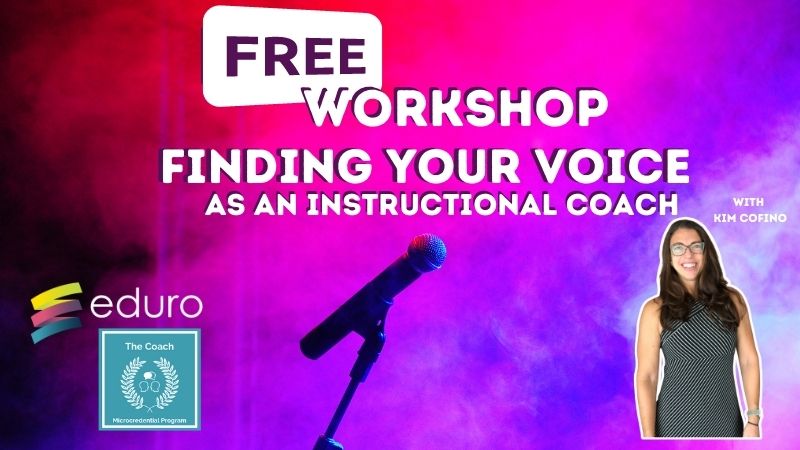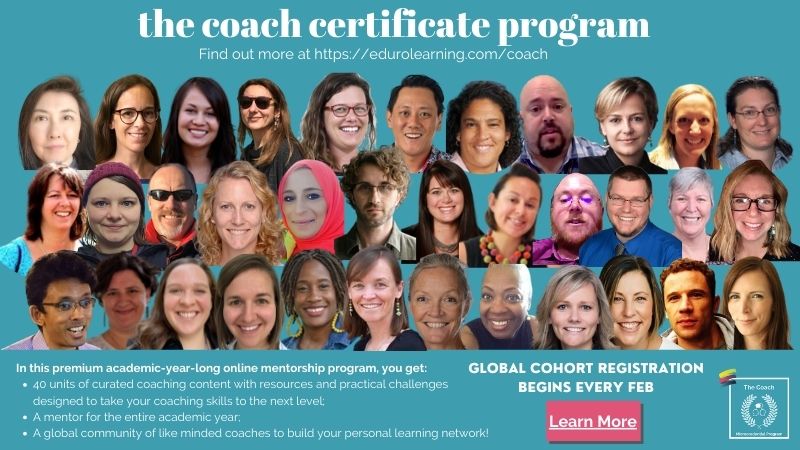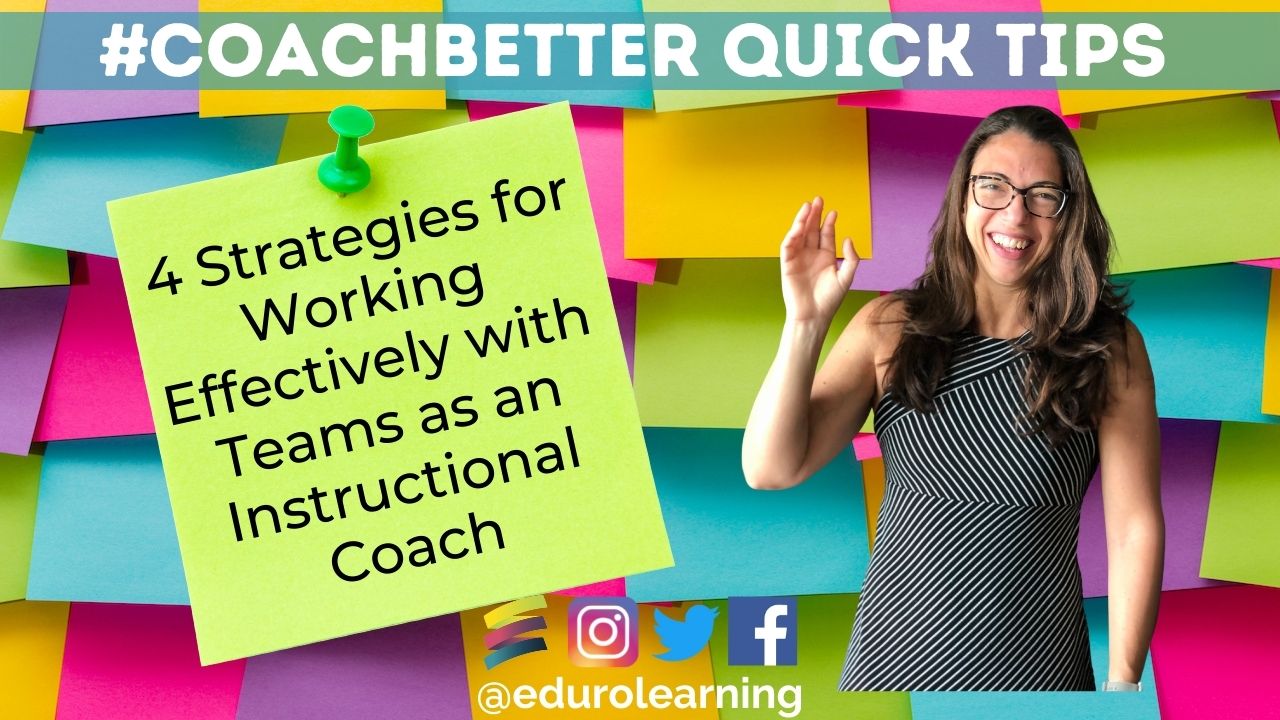It might sound surprising, but working with teams can be different than the way you work with individuals.
If you’ve started your coaching practice by building individual relationships, and beginning coaching cycles with individual teachers, and now you’re ready to leverage your work to bigger groups, like teams, there are a few things that are worth knowing to be prepared.
Today’s post features four strategies to do just that!
1: Do your research!
Be prepared before you start conversations with a whole team. One really easy thing to do is review curriculum documents, wherever they might be stored virtually physically to get an idea of what this team is teaching when they’re teaching it, and what might has worked in the past.
If teachers are doing reflective reviews on their curriculum units, every time they teach them and what they might be interested in adapting for the future, just having a general understanding of what they’re teaching when they’re teaching it and how you might be able to support them is a really good start to not going in completely cold.
If you want to dig a little bit deeper, another part of your research could be finding out a little bit about the team dynamics.
- How does this team work?
- Are they an effective team?
- Are there little challenges to the team dynamics that happen on a regular basis?
- What are the meetings like?
If you have a particular friend who’s on this team or someone you know reasonably well, you might consider actually reaching out to that person and asking them a little bit about how the team works:
- What’s been working well on the team…
- What do they like about their team…
- What do they hope and expect from having a coach at their meeting….
So you get a little bit of an inside scoop into what you might find in that actual meeting.
If you have the opportunity to do so, you could also pop into classrooms and get to know the students a little bit. You might offer to take a group to lead something small within the classroom, so you get a feel for each teacher and what things are like in their individual classrooms. Maybe you have an opportunity to work with these students for an extracurricular activity or a field trip – just a way to get to know the dynamics of the teachers on the team and the students in this year level or subject area team that you’re working with.
2: Attend Team Meetings
Of course you can do all the research and find out about the curriculum on your own independently before you actually attend team meetings, but you’re probably never going to be able to know exactly what this team needs, unless you’re in the meeting with them.
Unless it is expected that you are attending team meetings (like you’re officially assigned to a team, or this is part of the culture of the school), it might be a good idea to reach out to the head of department or the year level leader to ask them if it’s okay to attend this meeting. That gives you an invite (and welcome) to the meeting, as opposed to just kind of showing up.
It’s also really helpful if you can have even a mini conversation with the grade level leader or the team leader, just to find out a little bit about what they might need, how you can support them, what they’re expecting of you, and of course that it’s okay that you’re part of this conversation.
When you are attending a meeting, it’s also good practice to help clarify what your role and the purpose of you being in this meeting is for this particular time. Of course, if you’re a regular part of this team, you might not need to do this step. But if you’re just showing up every now and again for a team meeting, it’s important for the other people in the room to know:
- why you’re there,
- how you’re going to be part of the conversation for this day or this series of days,
- what is the expected outcome of your work together, and
- how are you going to provide value to their team meeting.
Some simple strategies you can use during the meetings are if you’re the facilitator of that meeting to have an agenda and share it in advance. This way, people know what you’re doing and when you’re going to be doing it. You could also offer to be the note taker during this meeting, to offer some value and stay engaged in the conversation. This idea came up in one of my The Coach mentoring calls earlier today, where the coachee that I was talking to is a coach in their school, and they said that they attend team level meetings and always take notes. It helps them get to know the names of the students in this year level. It helps them be a support person for the team. It’s just a small little thing that this person can do during those meetings to provide value for this team.
Another thing you could consider is asking teachers what they want to improve on based on how things went last year, instead of trying to fix things that are already working really well. There are always areas where teachers feel like this could have gone better. Starting with those is a good avenue into helping this team feel confident and successful in their work with you, instead of trying to adjust things that they’re already really happy with.
Find YOUR Unique Voice as a Coach!

We know that coaching conversations are an art. Finding just the right questions, just the right tone, and just the right phrases for YOU as an instructional coach, that work just right with your coachees, is a special skill. When we hear highly experienced coaches having a coaching conversation, their conversational choices seem so natural and easy. That’s because they have found their voice as a coach! Are you ready to find yours?
Join Kim for a free workshop, available right now, to learn the concrete strategies that I use with my private mentoring clients and inside The Coach Certificate and Mentorship program! Bonus: it’s pre-recorded, so you don’t have to wait to watch – and you can pause & replay whenever you need it! Are you ready to feel just as natural and confident in your coaching conversations as your coaching idols? Check out the Finding Your Voice as an Instructional Coach workshop at http://edurolearning.com/voice to get started!
3: Focus on Data
Data can be something that teams shy away from or something that they feel they don’t tend to spend time on. It can be seen as something that we know is important, but doesn’t always seem super fun. If you, as the coach can come in and share assessment data and strategies to help work towards growth in those areas, that’s actually providing a lot of value for teams by making a topic that might be stressful or uncomfortable, seem approachable and easy.
If you have the opportunity to actually look at that data and look at student work, so teams can do a little bit of moderation and understand how learning is looking in different classrooms across the subject area or grade level, that’s a great way to start conversations among team members that might not ordinarily happen, because sometimes looking at data just doesn’t become a priority in our busy day-to-day teaching lives.
4: Be a Support
Help them understand how you can help them. One of the ways you can do this is having a menu of options, potentially tailored to this department or grade level:
- What are the services you provide as a coach?
- What are the different opportunities that team members have to engage with you?
- What are the ways that you can support them?
If you have taken time to look at their curriculum in advance, or to look at some of the assessment data for this year level or subject area, you might bring some resources that really jumped out at you that you think will help them in their growth opportunities in these areas. And then of course, if you’re visiting classrooms and working with individual teachers, can you connect those teachers to each other, to help them see opportunities for learning within their department or their subject area. Can you be that connection for the team that maybe they were missing because they weren’t looking at it through the specific lens that you bring as an instructional coach?
Hopefully one of those ideas in there could be helpful for you in your work with teams as an instructional coach. If you try any of those strategies out, please let me know. Please share in the comments or reach out to me on social media. I’d love to hear how any of those go for you.
Watch the Video
Level Up Your Coaching with The Coach!
If you are ready to develop your coaching practice over the next academic year, and explore topics like transitioning your work from individuals to teams, please join us for our next cohort of The Coach!
Wherever you are in building a coaching culture in your school, The Coach will give you the strategies, skills and tools you need to make coaching a success and will empower you to confidently apply instructional coaching strategies in any situation – from building a coaching program, to having coaching conversations, to being a leader in your school community. We facilitate only one cohort each academic year so we can offer individualized support for each participant.
Registration for our next global cohort opens on the 21st February and closes on the 14th of March.

Find out more at: https://edurolearning.com/coach/

Recent Comments